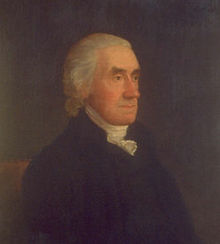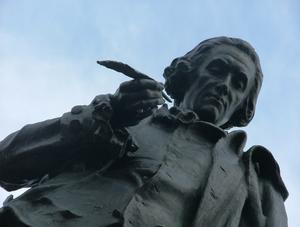Robert Treat Paine
Robert Treat Paine was a signer of the Declaration of Independence and served as the first Attorney General of Massachusetts and a member of the Massachusetts Supreme Judicial Court. He was a lifelong Congregationalist and a devout Christian. When his church, the First Church of Boston, moved into Unitarianism late in his life, Paine followed that path.
|
Robert Treat Paine was born in Boston, Massachusetts, on March 11, 1731. He was one of five children of the Rev. Thomas Paine and Eunice (Treat) Paine. His father was pastor of Franklin Road Baptist Church in Weymouth but moved his family to Boston in 1730 and subsequently became a merchant there. His mother was the daughter of Rev. Samuel Treat, one of the principal founders of Newark, New Jersey. The Treat family in particular had a long history in the British colonies dating back to the Mayflower.
Paine attended the Boston Latin School and at the age of fourteen entered Harvard College, from which institution he graduated in 1749 at age 18. He then was engaged in teaching school for several years back at the Boston Latin and at Lunenburg, Massachusetts.
He also attempted a merchant career with journeys to the Carolinas, the Azores, and to Spain, as well as a whaling voyage to Greenland. He began the study of law in 1755 with his mother's cousin in Lancaster, Massachusetts. Another cousin, Col. Samuel Willard, raised a regiment to fight in the French and Indian War. Paine was unsuccessful in gaining an officer's commission in that regiment and so volunteered to serve as chaplain.
When he returned from a brief military campaign to Lake George (the Crown Point Expedition), he did some occasional preaching and returned to his legal studies. In 1756 he returned to Boston to continue his legal preparations with Samuel Prat, and he was admitted to the bar in 1757. He first considered establishing his law practice at Portland (then part of Massachusetts but now in Maine), but instead in 1761 moved to Taunton, Massachusetts, then back to Boston in 1780.

|
In 1768 he was a delegate to the provincial convention which was called to meet in Boston and along with Samuel Quincy conducted the prosecution of Captain Thomas Preston and his British soldiers following the Boston Massacre of March 5, 1770. John Adams was opposing counsel, and his arguments won the jury's sway, and most of the troops were let off.
Paine served in the Massachusetts General Court from 1773 to 1774, in the Provincial Congress from 1774 to 1775, and represented Massachusetts at the Continental Congress from 1774 through 1778. In Congress, he signed the final appeal to the king (the Olive Branch Petition of 1775), and helped frame the rules of debate and acquire gunpowder for the coming war, and in 1776 was one of the signers of the Declaration of Independence.
He returned to Massachusetts at the end of December 1776 and was speaker of the Massachusetts House of Representatives in 1777, a member of the executive council in 1779, a member of the committee that drafted the state constitution in 1780. He was Massachusetts Attorney General from 1777 to 1790 and prosecuted the treason trials following Shays' Rebellion.
In 1780, He was a charter member of the American Academy of Arts and Sciences. He later served as a justice of the state supreme court from 1790 to 1804 when he retired. When he died at the age of 83 in 1814 he was buried in Boston's Granary Burying Ground.

|







No comments:
Post a Comment